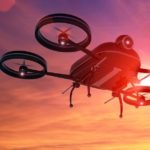"Drones can save lives"
Farming and emergency situations. These are two of the areas in which the drone sector is rapidly gaining ground. In other areas faster development is often hindered by legislation.

Can Padró. Security&Safety Training. Seventy hectares beneath the Montserrat mountains, 50 kilometers from Barcelona (Spain). A boat anchored to the ground appears beneath a low hill. During the course of the year it is used to perform scores of emergency drills. Help arrives by land but from the air as well.
Several drones fly over the area filming fire fighters, police and health workers dealing with a critical situation. The footage provides a comprehensive view of what is happening to the heads of operations as they make fast decisions to cope with and try to avoid a tragedy.
The drones were the last to reach Can Padró, the specialist emergency management center which, as manager Ana Rodríguez explains, "trains hundreds of professionals who deal with risk situations as part of their job". A pioneer in safety training, the center has an ATO license for delivering drone courses to Spain's National Air Security Agency (AESA), the body that regulates this sector.
And once it can be piloted, a drone can be used to save lives. Can Padró was recently visited by Jordi Folk, general secretary of Aedron (Spanish Association of Drones and Similar), who finds the topic of emergencies particularly fascinating. “It's where these devices can be used to save lives. If you get lost in a cave, they can find the exact spot, and very fast."
In the case of a catastrophe or disaster, drones can be used where they would not normally be legal, as long as the operator is certified. Can Padró prepares operators for this. Piloting a drone is just one more step in the overall training for professionals who risk their lives trying to save others.
The legal debate in Spain
The legal framework for these devices is currently a hot topic of debate. In recent weeks representatives of Aedron have held meetings with members of AESA and a bill with new legislation for Spain is currently being finalized. As the current legislation stands, it is illegal to fly drones over built-up areas. A year ago the AESA banned drones from flying over cities after being shocked by what Folk describes as "videos of shocking reckless flights" on the Internet.
Folk mentions the regulation of the sector to avoid unauthorized practice by unlicensed persons. "Regulation puts us on a par with aerial work. We are not ground workers so we're governed by aviation legislation, with demanding standards that require training and investment," he explains. With the law in his hand, Folk says, "The current legislation regulates all commercial work. It says that you can't fly over houses or people, you can only fly in daylight, you can't fly above 120 meters, and you can't be more than 500 meters from the pilot. Everything that is not commercial is also more or less covered by these conditions. If you buy a toy drone, you have to fly it in a vacant lot and meet the same requirements."
A new bill contemplates "the possibility of flights in urban environments for aircraft weighing less than 10 kg in a defined area or more than 150 meters away from buildings and more than 50 meters away from people who are not under the operator's control. These types of operations have to be authorized for reasons of public safety."
The future of the sector
Folk explains the importance of this change in legislation: “The money isn't in the countryside, it's in cities. It's currently illegal to fly over cities so we have to refuse 95% of the work we're offered." Ignorance of the law means that Folk, a photographer, often receives commissions for jobs that are illegal, which he turns down. The smallest fine is 4,500 euros.
“The people who are most benefiting from this are retailers, rather than trainers, pilots or operators. Retailers don't want it to get out that there are restrictions on using these devices because then they'll lose money. But we need to publicize the laws, and drones should only be sold in model aeronautics stores so that you know you're dealing with specialists."
There are no official figures on the number of drones in Spain, although according to Folk "it is expected to grow exponentially”. In his opinion, one of the sectors that "is investing the most in developing and using drones is farming. I don't know if it's because of the current legislation or because it has a lot of money and drones cut their costs enormously."
Who can pilot a drone?
"To pilot a drone," explains Folk, "you have to have a theory certificate, practical training specific to the model you are going to pilot, and a medical aviation certificate. You have to take a training course with practical and theory components. And pilots can't just work on their own. Every company that carries out aerial work with drones has to be registered with the AESA.”